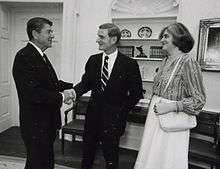Nicholas Platt
| Nicholas Platt | |
|---|---|
 Nicholas Platt, center, with his wife Sheila and President Reagan, 1982 | |
| Personal details | |
| Born |
March 10, 1936 New York City |
| Spouse(s) | Sheila Maynard |
| Children | 3 |
| Alma mater |
Harvard College Johns Hopkins SAIS |
| Occupation | Diplomat |
Nicholas Platt (born March 10, 1936) is an American diplomat who served as U.S. Ambassador Extraordinary and Plenipotentiary to Pakistan, Philippines, Zambia, and as a high level diplomat in Canada, China, Hong Kong, and Japan. He is the former president of the Asia Society in New York City.
Early years
Platt was born in New York City, the son of Helen (née Choate) and architect Geoffrey Platt. His maternal great-grandfather was diplomat and lawyer Joseph Hodges Choate. Platt entered the Foreign Service of the United States in 1959. Prior to that, he was a research assistant at the Washington Center for Foreign Policy Research. From 1959 to 1961, he served as vice consul in Windsor, Ontario, Canada, where his son, the actor Oliver Platt[1] was born. His older son is Adam Platt, New York Magazine restaurant critic, and his younger son is Nicholas Platt, Jr. His wife is Sheila Maynard, a clinical social worker who worked in Islamabad,[2] granddaughter of Arthur Scott Burden and the Hon. Cynthia Burke Roche.
Education
Platt graduated from the prep school St. Paul's School, Harvard College (B.A., 1957) and Johns Hopkins University School of Advanced International Studies (M.A., 1959). At Harvard, he was a member of the Porcellian Club. He is articulate in the Chinese, German, French, and Japanese languages.
Embassy postings
He studied the Chinese language, 1962–1963, at the Foreign Service Institute and in Taichung, Taiwan. In 1964 he was assigned as political officer at the American consulate general in Hong Kong until 1968, when he became China desk officer in the Bureau of East Asian and Pacific Affairs.
From 1969 to 1971, Platt was chief of the Asian Communist Areas Division of the Bureau of Intelligence and Research. In 1971–1973, he served as Deputy Director, and then Director, of the Secretariat Staff in the Department of State.
As a young diplomat, Platt accompanied President Richard Nixon on the historic trip to Beijing in 1972 that signaled the resumption of relations between the U.S. and China.
Platt was assigned as chief of the political section, U.S. Liaison Office, Peking, China, 1973–1974, and then as deputy chief of the political section at the Embassy in Tokyo, Japan, 1974–1977. He returned to Washington to serve as Director for Japanese Affairs in 1977 and then served as a staff member on the National Security Council at the White House, 1978–1980. From 1980 to 1981, he was Deputy Assistant Secretary of Defense, International Security Affairs, Department of Defense, and then returned to the Department of State as Deputy Assistant Secretary, International Organization Affairs, 1981–1982.
Platt was appointed Ambassador to the Republic of Zambia in 1982, where he served until 1985, when he was named Special Assistant to the Secretary of State and Executive Secretary of the Department of State.
In 1987, he was appointed Ambassador to the Philippines.[3] In 1991, he was appointed Ambassador to Pakistan where he remained until November 1992.[4]
References
- ↑ "Two Pinoy Christmases". Philippine Daily Inquirer. February 26, 2004. Retrieved July 6, 2010.
- ↑ "Weddings; Camilla Campbell, Oliver Platt". New York Times. 1992-09-13. Retrieved 2008-03-10.
- ↑ "Mace Rule Violated In Platt's 2nd Visit". Manila Standard. August 27, 1987. Retrieved July 6, 2010.
- ↑ "Former Ambassadors - Nicholas Platt". United States Department of State. Retrieved July 6, 2010.
External links
- Video: Nicholas Platt discusses his book 'China Boys' Asia Society, New York, 4/13/2010
| Diplomatic posts | ||
|---|---|---|
| Preceded by Stephen W. Bosworth |
United States Ambassador to the Philippines 1987–1991 |
Succeeded by Frank G. Wisner |
| Preceded by Robert B. Oakley |
United States Ambassador to Pakistan 1991–1992 |
Succeeded by John Cameron Monjo |